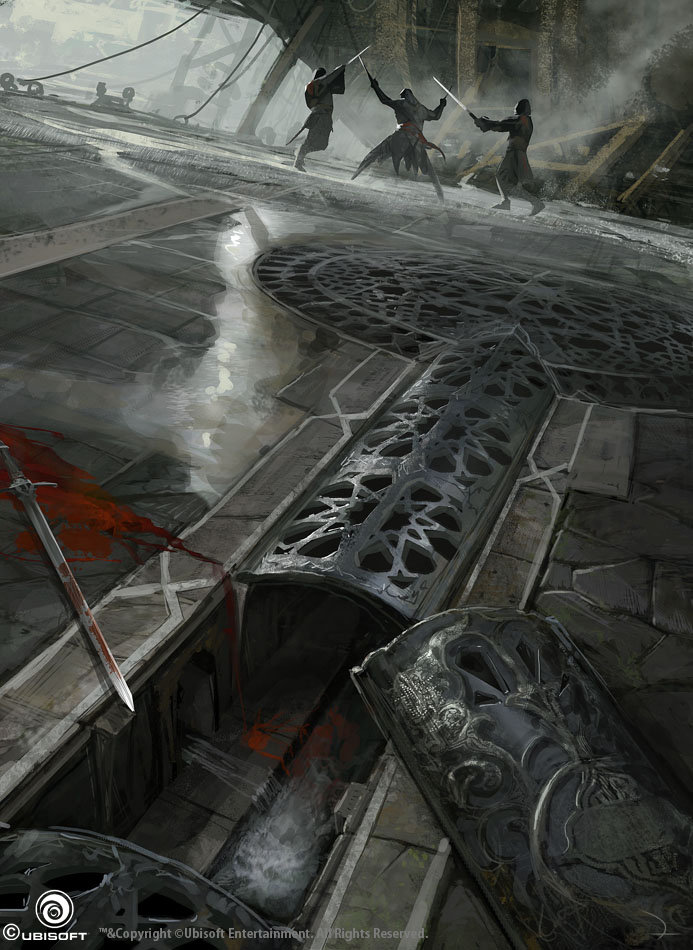

Roguish Archetype: The Accuser
Grim and determined inquisitors, an Accuser roots out the enemies of his faith, using trickery and guile when righteousness and purity is insufficient. Though Accusers have a fanatical devotion to their god, they often consider themselves above the standard conventions of the church.
Accusers are the assassins of the faith militant, opposing enemies without and corruption within the church. They tend to move from place to place, hunting heretics or investigating mysteries both sacred and profane. As a result, accusers often join up with adventurers to mask their true aims.
Not all gods have these followers, and it is not uncommon for an accuser to belong to a secret cult, or even be declared heretical by the main body of a deity's worshipers. A heretical accuser, or one of an evil god, might deal necrotic damage instead of radiant with its features below.
Judgement
At 3rd level, you gain the power to proclaim your deity's disfavor. As a bonus action, you can impose one sentence on a creature that you can see. A sentence lasts for one hour, or until you impose Judgement on a different creature.
Excommunication
When you see the target attack a creature other than you that is within 30 feet of you, you can use a reaction to impose disadvantage on the attack roll.
Execution
You can add your sneak attack dice to a cantrip's damage roll against the target, if a weapon attack made under the same circumstances would fulfill all of the usual requirements for making a sneak attack. This counts as a use of sneak attack.
Exorcism
Your sneak attack deals radiant damage to the creature instead of its usual damage type, plus an additional 1d6 damage if it is a fiend or undead.
Pact Magic
Also at 3rd level, you augment your inquisitorial prowess with magic granted by your deity, a pact made to further your divine mandate.
Cantrips
You know the spell sacred flame, plus one cantrip of your choice from the cleric spell list. You learn an additional cleric cantrip of your choice at 9th and 15th level.
Spell Slots
The Accuser table shows how many spell slots you have. The table also shows what the level of those slots is; all of your spell slots are the same level. To cast one of these spells, you must expend a spell slot. You regain all expended spell slots when you finish a short or long rest.
Spells Known of 1st level or Higher
You know two 1st-level cleric spells of your choice, one of which you must choose from the Abjuration or Enchantment spells on the cleric spell list.
The Spells Known column of the Accuser table shows when you learn more cleric spells of 1st level or higher. Each of these spells must be an Abjuration or Enchantment spell, and must be no higher than what's shown in the table's Slot Level column for your level. The spells you learn at 8th, 14th, and 20th level can come from any school of magic.
Whenever you gain a level in this class, you can replace one of the cleric spells you know with another spell of your choice from the cleric spell list, which must be of a level for which you have spell slots, and must be an Abjuration or Enchantment spell, unless you're replacing a spell you gained at 3rd, 8th, 14th, or 20th level.
Spellcasting Ability
Wisdom is your spellcasting ability for your accuser spells, so you use your Wisdom whenever a spell refers to your spellcasting ability.
In addition, you use your Wisdom modifier when setting the saving throw DC for an accuser spell you cast and when making an attack roll with one.
Spell attack modifier = your proficiency bonus + your Wisdom modifier
Spellcasting Focus
You can use a holy symbol (see the Adventuring Gear section) as a spellcasting focus for your accuser spells.
Accuser Spellcasting
| Level | Cantrips Known |
Spells Known |
Spell Slots |
Slot Level |
|---|---|---|---|---|
| 3rd | 2 | 2 | 1 | 1st |
| 4th | 2 | 3 | 2 | 1st |
| 5th | 2 | 3 | 2 | 1st |
| 6th | 2 | 3 | 2 | 1st |
| 7th | 2 | 4 | 2 | 2nd |
| 8th | 2 | 5 | 2 | 2nd |
| 9th | 3 | 5 | 2 | 2nd |
| 10th | 3 | 5 | 2 | 2nd |
| 11th | 3 | 6 | 2 | 2nd |
| 12th | 3 | 6 | 2 | 2nd |
| 13th | 3 | 7 | 2 | 3rd |
| 14th | 3 | 8 | 2 | 3rd |
| 15th | 4 | 8 | 2 | 3rd |
| 16th | 4 | 9 | 2 | 3rd |
| 17th | 4 | 9 | 2 | 3rd |
| 18th | 4 | 9 | 2 | 3rd |
| 19th | 4 | 10 | 2 | 4th |
| 20th | 4 | 11 | 2 | 4th |
Faithful Hunch
At 9th level, you can contemplate an ongoing investigation and potentially know whether your suspicions are valid. After collecting some form of relevant evidence, make a short statement of fact to your DM and receive one of these results:
- Correct. If the hunch is the exact truth, such as if a particular individual is responsible for a crime, or if a particular organization is behind a series of events.
- Incorrect. If the hunch is entirely off-base, such as if a suspect had nothing to do with a crime, or a suspected organization had no interest or hand in a series of events.
- Right track. If the hunch is partially correct, such as if a suspect participated in a conspiracy or had foreknowledge of the crime in question, or if a suspected organization directly profited from and knew about but did not entirely orchestrate a series of events.
After using this ability on a mystery or subject, you cannot do so again until you have collected new, relevant evidence. Once you have used this ability, you cannot do so again until you have finished a long rest.
Our Chief Weapon
At 13th level, a surprised or frightened creature has disadvantage on saving throws against your spells.
Final Judgement
At 17th level, when you damage a creature on which you have invoked your Judgement, you can use a bonus action to call down divine wrath. This counts as a use of sneak attack.
The target must succeed on a Constitution saving throw against your spell save DC or take radiant damage equal to its current hit points. If the target is not native to the plane you are on (and you are), it has disadvantage on this saving throw. On a success, the target instead takes radiant damage equal to your sneak attack damage.
You can use this ability once, and regain use of it when you finish a long rest. You can instead choose to expend an Accuser spell slot to use this ability.

